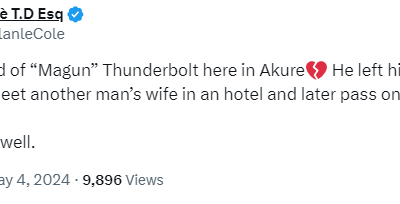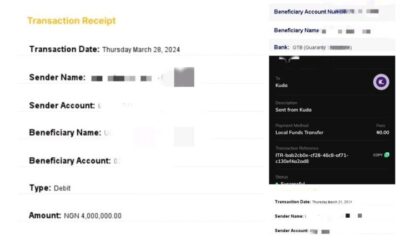Headline
Supreme Court Grants FG Exclusive Control Of All Inland Waterways
Published
4 months agoon
By
Editor
The Supreme Court has granted the Federal Government total control of all waterways in the country, including the right to levy and licence operators in the sector.
The court, in a landmark judgement it delivered last Friday, in an appeal marked: SC/CV/17/2018, held that States lack the constitutional right to impose levies on businesses operating in the nation’s inland waterways.The appeal was filed by the National Inland Waterways Authority, NIWA, and the Nigerian Maritime Standard and Safety Agency, NMSSA, Minister of Mines and Steel Development, as well as the Minister of Transport.
Respondents to the case were the Lagos State Waterways, the state’s Commissioner for Waterfront Infrastructure Development, the state’s Attorney-General, the Governor of Lagos State, the Incorporated Trustees of Association of Tourist Boat Operators and Water Transportation of Nigeria, ATBOWTN, and the Incorporated Trustees of Dredgers Association of Nigeria, DAN.
The apex court held that it was wrong, unlawful and illegal for states to seek to control the sector and impose levies.
READ ALSO: Tinubu Approves ₦12bn Outstanding Payments For Super Eagles, Others
The appeal, filed in 2018, was prosecuted for the Appellants by a team of lawyers led by the present Attorney General of the Federation and Minister of Justice, Prince Lateef Fagbemi, SAN.In its lead judgment that was prepared by Justice Inyang Okoro and read by Justice Emmanuel Agim, the Supreme Court held that NIWA is the only agency saddled with the responsibility to levy, impose, and charge rates of utilization along the declared waters of the Nigerian Inland Waterways Authority.
It added that NIWA is the rightful and legal agency of FG with the powers to exclusively manage, direct and control all activities on the navigable waters and its right of way, throughout the country, for inland navigation, pursuant to Sections 8 and 9 of NIWA Act.
The apex court equally agreed with Fagbemi, SAN, that activities of the Lagos government and its agencies constituted a flagrant usurpation and an illegal encroachment on the statutory functions of NIWA because the waterways of Lagos State, among others in Nigeria, are under the Exclusive Legislative List set out in Part 1 of the Second Schedule to the 1999 Constitution.
It held that only FG, through the National Assembly, could legislate on Maritime Shipping and Navigation, stressing that the power to legislate on any subject in the Exclusive Legislative List was not within the rights of the Lagos State Government.
READ ALSO: 85-year-old Grandpa Bags Life Jail For Killing Wife
The court noted that existing laws did not favour Lagos government’s arguments on resource control, adding that political stakeholders, including the Legislature, could work on ways to amend the law to address the concern raised by Lagos and others on the issue.
It restored the judgement delivered on March 28, 2014, by Justice John Tsoho of the Federal High Court in Lagos and reversed the July 18, 2017 verdict of the Court of Appeal (Lagos Division), which set aside the Federal High Court judgment.
The Appellants had among other things, argued that the activities of the Lagos State Waterways Authority, LASWA, created by the Lagos Government, through the enactment of LASWA Law No. 14 of 2008 (LASWA 2008) by the state’s House of Assembly, to regulate, develop and manage all aspects of the waterways in Lagos State, was unconstitutional.
They argued that the inland waterways within Lagos State, not captured by the National Inland Waterways Act, are within the legislative competence of the state’s Legislature.
READ ALSO: Liverpool Stage Late Show To Stun Arsenal In FA Cup Third Round
It was their position that states could collect taxes/levies on businesses on waterways within their territory.
However, confronted with a regime of multiple charges by agencies of both FG and Lagos State, ATBOWTN and DAN, in a suit marked: FHC/L/CS/543/2012, approached the Federal High Court in Lagos to determine which tier of government was empowered by extant laws to license and levy business operators on the nation’s inland waterways.
In his judgment on the case, Justice Tsoho, on March 28, 2014, held, among others, that NIWA and NMSSA were the proper and lawful agencies with authority in matters relating to the commercial activities of ATBOWTN and DAN, who are involved in water tourism, water transportation and sand dredging within the national inland waterways.
Justice Tsoho restrained the Lagos State Waterways Authority and the state’s Commissioner for Waterfront Infrastructural Development from further seeking to control the commercial activities of the plaintiffs – ATBOWTN and DAN.
Justice Tsoho’s judgement was eventually vacated on July ,18, 2017 in an appeal marked: CA/L/886/2014, which was fled by the Governor of Lagos State and three others. Dissatisfied with the development,
NIWA and the three other Appellantts took the matter before the Supreme Court which in the judgement it delivered last Friday, reaffirmed the earlier judgement of the high court.
You may like
Headline
Porn Star Testifies Against Trump At Hush Money Trial
Published
1 day agoon
May 8, 2024By
Editor
The porn star at the heart of Donald Trump’s historic criminal trial, Stormy Daniels, testified on Tuesday about an alleged 2006 sexual encounter with the former president in a hotel penthouse suite.
Trump, 77, is accused of falsifying business records to reimburse his lawyer, Michael Cohen, for a $130,000 hush money payment to Daniels on the eve of his 2016 election against Hillary Clinton, when the lurid story of marital infidelity could have sunk his campaign.
Prosecutor Susan Hoffinger announced “The people call Stormy Daniels,” as Trump, who is seeking to recapture the White House in November, sat at the defense table in the Manhattan courtroom flanked by his lawyers, AFP reports.
What followed was detailed testimony about the sexual encounter Daniels said she had with Trump – his pajamas, his boxer shorts, the sexual position, that he did not wear a condom – all while the former president, sitting just feet away, stared on in silence, stony-faced.
Trump has denied having sex with Daniels, and his defense team sought, unsuccessfully, to have a mistrial declared.
READ ALSO: Biden Calls Trump Main Threat To US Democracy
The extraordinary courtroom face-off comes six months before election day when Trump will try to defeat Democratic President Joe Biden.
Daniels walked prosecutors through her difficult childhood in Louisiana, a stint as a stripper and her eventually joining the adult film industry.
The 45-year-old, whose real name is Stephanie Clifford, said she met Trump at a celebrity golf tournament in Lake Tahoe where she was employed as a greeter by X-rated movie company Wicked Entertainment.
Daniels said she was 27 at the time and Trump was “probably older than my father.”
She said a member of Trump’s security detail told her the real estate tycoon wanted to have dinner with her. She was reluctant but agreed after discussing it with her publicist.
When she arrived at the penthouse where Trump was staying he emerged wearing “silk or satin pajamas which I immediately made fun of,” Daniels told the jury.
READ ALSO: Trump Urges Republicans To Kill Ukraine Aid Bill
“I said ‘Does Mr Hefner know you stole his pajamas?’” she said in a reference to the outfit favored by the late Playboy magazine founder Hugh Hefner.
Trump changed clothes and they began talking about adult movies.
“He was very interested in a lot of the business stuff,” Daniels said.
Trump, who was married at the time to his current wife, Melania, suggested Daniels be on his hit reality television show, “The Apprentice,” she said.
Daniels said she went to the bathroom at one point and when she emerged Trump was on the bed in boxer shorts and a T-shirt.
“It startled me,” she said. “The intention was pretty clear.”
“I was not threatened verbally or physically,” Daniels said, although there was an “imbalance of power.”
She said they had brief sex on the bed “in missionary position” and Trump did not wear a condom.
“I felt ashamed I didn’t stop it, didn’t say no,” Daniels said.
READ ALSO: Trump Indicted For Attempts To Overturn US 2020 Elections
Daniels said she met with Trump again on several occasions but cut off contact when it became clear she would not appear on “The Apprentice.”
After Trump announced his candidacy for president, Daniels said her publicist suggested she could sell her story and put her in touch with Keith Davidson, a Hollywood lawyer who testified previously at the trial.
“My motivation wasn’t money, it was to get the story out,” Daniels said.
She said she entered into a non-disclosure agreement in October 2016 on the eve of the presidential election negotiated by Davidson and Cohen for which she was paid $130,000.
“I couldn’t tell my story, he couldn’t tell the story,” she said.
After a lunch break, Trump’s attorney Todd Blanche asked Judge Juan Merchan to declare a mistrial, objecting to some of Daniels’ testimony, particularly her claim that she was threatened in 2011 by a man in a Las Vegas parking garage who allegedly warned her not to talk about Trump.
“It’s extremely prejudicial to insert safety concerns into a trial about business records,” Blanche said.
Merchan denied the motion, saying “I don’t think we have reached a point where a mistrial is in order.”
Trump is under a partial gag order prohibiting him from publicly attacking witnesses, the jury or court staff.
Merchan has already fined him $10,000 for breaching the gag order and warned Trump he may face jail time for future violations.
Headline
Naira Abuse: Trouble Looms As Group Petitions EFCC, Wants Edo APC Candidate Prosecuted
Published
1 day agoon
May 8, 2024By
Editor
The All Progressives Congress candidate in the September 21 governorship election in Edo State, Monday Okpebholo, is at risk of being sentenced to six- months imprisonment in line with the Central Bank of Nigeria Act of 2007 as a coalition of civil society organisations under the aegis of the Network of Civil Society Organisations in Nigeria accused him of abusing the Nigerian currency, the naira.
The group lodged the complaint with the Economic and Financial Crimes Commission against Okpebholo in a petition dated May 2, 2024, and addressed to the chairman of the EFCC.
The petition was signed by the group’s National Coordinator, Victor Kalu, and National Secretary, Ali Abacha.
The coalition claimed the senator is guilty of the offence of naira abuse and mutilation, citing the CBN Act of 2007, which declares such actions as punishable offences.
READ ALSO: Suspended Edo Lawmaker, Iyamu Breaks Silence, Says All Issues Will Be Resolved
The coalition said it is “disappointment that prominent individuals, including lawmakers, have violated this provision of the CBN Act.”
Meanwhile, they commended the EFCC for its “swift response in arresting and charging individuals who have been caught on viral videos abusing and defacing the Naira at social events such as the cases of Mr Okuneye Idris Olarewaju, popularly known as Bobrisky, and Mr Pascal Okechukwu, also known as Cubana Chief Priest, who have faced legal consequences for their actions.”
While praising the EFCC for its actions, the coalition demanded that all individuals captured in viral videos abusing the Naira should be promptly arrested and brought to justice, as no one is above the law.
They called on the EFCC and other law enforcement agencies to investigate the “viral video involving Senator Monday Okpebholo, who is seen engaging in Naira abuse and mutilation.”
They added that Okpebholo should be held accountable for his actions as a representative of the people.
READ ALSO: [ICYMI]Rivers: Siblings Flog Teacher, Lock Up Admin Officer For Flogging Brother
They, however, warned that failure to address the viral video involving Okpebholo would result in the coalition taking further actions.
They threatened to mobilise their members, supporters, and democracy advocates for a peaceful protest against the EFCC, citing selective action and bias if the EFCC failed to address the viral video involving Okpebholo.
In his response, the senator refuted the allegation, saying it was false.
Okpebholo, in a statement issued in Abuja on Tuesday, described the allegation as a hatchet job targeted at smearing his image ahead of the September governorship election.
He blamed his detractors and the opposition camp as being the brain behind the campaign of calumny.
READ ALSO: Naira Abuse: EFCC, Cubana Chief Priest To Settle Out Of Court
While stressing that he has never been arrested by the police for any civil or criminal offence, the lawmaker insisted the man in the video circulating on social media was not him.
He said, “As a private and public person, I have never sprayed or mutilated the naira in my over 50 years on earth. It baffles me why these agents will fabricate fake news to tarnish my image ahead of the election. I therefore called on the IGP to investigate the faces behind the petition and prosecute them accordingly.
“They are scouting for fake news and non-existent things to blackmail me and lie to Edo people. Unfortunately, we know what they are up to. They are smelling the defeat already. Edo people have already decided, and no amount of State-sponsored intimidation will work.
“In Edo State, President Bola Tinubu-led APC administration is working. The federal government is reconstructing federal roads in Edo Central, Edo North, and Edo South. That is why Edo people must take sides with the APC and vote for me as the next governor of Edo State.
“We will bring the Federal Government closer to the Edo people. We have been isolated for too long, and it is time to end that alienation.”
PUNCH
Headline
Mother Throws Disabled 6-year-old Son Into Crocodile Infested River [PHOTOS]
Published
2 days agoon
May 7, 2024By
Editor
A mother has thrown her disabled six-year-old son into a crocodile-infested river where he has reportedly been mauled to death by reptiles.
Savitri Kumar, 26, from Uttara Kannada, a district in Karnataka, India, had a heated argument with the boy’s father, Ravi Kumar, 27, who repeatedly ordered her to “throw the child away,” the Times of India reports.
Police say her husband allegedly questioned her decision to give birth to a child with a disability.
When the parents fought about their son again on Saturday evening, May 4, Savitri was “distressed” and reportedly threw her son into a waste canal that flows into the Kali river, which is infested with crocodiles.

Father of the son
READ ALSO: Benue To Build Brewery As Residents Spend N850m On Beer Monthly
Neighbours who witnessed this called the police, who deployed divers to search for the boy in the water, but to no avail, as it was dark.
They returned on Sunday morning, May 5, and found the child’s body, which showed bite marks all over.
The boy suffered severe injuries and was missing a hand, which a police officer suggested indicated that the boy was mauled to death by one or more crocodiles.
A post mortem has been ordered to determine the six-year-old’s cause of death.

READ ALSO: JUST-IN: Terrorists Kill Two, Abduct 18 In Fresh Kaduna Attack
The couple also has another son aged two and is said to frequently fight about their older son’s speech impediment.
Officers have launched an investigation into the incident.
A police officer told local media that it was a “murder” case and that both the husband and wife have been arrested.

JUST IN: Panic As Oyo Demolishes Shops In Popular Ibadan Market

BREAKING: Reps To Probe Lagos-Calabar Coastal Highway Procurement Process

Group Says Court Would Rectify LP Primary Infractions In Favour Of Imansuangbon
Trending

 Metro3 days ago
Metro3 days agoKidnappers Sleep Off After Abducting Pastor’s Wife, Others In Ondo

 Headline3 days ago
Headline3 days agoICYMI: Pandemonium During Church Service As Man Pulls Gun, Attempts To Shoot Pastor [VIDEO]

 Headline5 days ago
Headline5 days agoPHOTOS: Moment 23-year-old Miss Ecuador Beauty Queen Is Gunned Down In Hail Of Bullets

 News4 days ago
News4 days agoJUST IN: SERAP Drags 36 Govs, Wike To Court Over N5.9tn, $4.6bn Loans

 Metro4 days ago
Metro4 days agoMan Dies On Top Of Married Woman In Akure

 Headline2 days ago
Headline2 days agoMother Throws Disabled 6-year-old Son Into Crocodile Infested River [PHOTOS]

 Headline5 days ago
Headline5 days agoVIDEO: Arsenal Pay Tribute To 14-year-old British-Nigerian Fan Daniel Anjorin Killed In UK

 News5 days ago
News5 days agoWhy I Refused To Return Govt Vehicles – Ex-Edo Gov, Shaibu

 Headline5 days ago
Headline5 days agoFind The Man Who Stole $30000 From Me, Get $2000 Reward – Nigerian Man Cries Out

 News2 days ago
News2 days ago‘I’m Considering Having 4th Child’ – Mother Of Three Who Breastfeeds Husband , 3 Kids [PHOTOS]
























